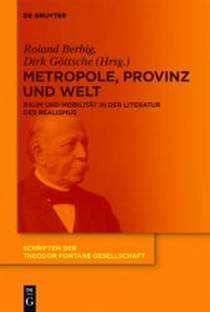
25/06/2013, by CLAS
Nineteenth-century German literature reflects globalisation and modernisation
The literature of German Realism, written between c. 1840 and 1900, has often traditionally been seen as a turn against modernisation, a retreat into German provincialism and hence a deviation from the European literary trajectory from Romanticism to Modernism. International scholarship in German literary studies since the later 1990s has challenged this idea, and research into broader colonial history (Postcolonial Studies) and the history of globalisation have played a particular role in remapping German literary and cultural history in the nineteenth century – a century now seen as marked by a complete transformation of the world (‘Verwandlung der Welt’, as the prominent German historian Jürgen Osterhammel calls it in his world history of the nineteenth century). New research, in which University of Nottingham staff take a leading role, shows how the literature of Germany engages productively with modernisation and globalisation, even though often from a firmly Eurocentric perspective.
A new book, based on collaboration between the literary societies devoted to the study of the German late nineteenth-century writers Wilhelm Raabe and Theodor Fontane, is now giving this reassessment of German Realism significant new momentum by reconsidering how German literature of the period maps and rethinks the relationship between the local, the modern metropolis and the globalising world in the context of nineteenth-century modernisation:
Metropole, Provinz und Welt. Raum und Mobilität in der Literatur des Realismus. Ed. by Roland Berbig and Dirk Göttsche. Berlin: de Gruyter 2013 (= Schriften der Theodor Fontane-Gesellschaft, 9). 349 pp., ISBN 978-3-11-030950-8, € 89.95
The volume contains 15 studies by international scholars on the literary remapping of time and space in 19th century German Realism, as reflected in triangular constellations of the metropolis, the province and the world. Building on the reappreciation of space and mental maps in the humanities (the so-called ‘spatial turn’), the chapters explore in theoretical perspective, as well as in a range of case studies, how authors such as Theodor Fontane, Wilhelm Raabe, Berthold Auerbach, Friedrich Spielhagen and others engage with the radical transformation of their world in the context of accelerating modernization, globalisation, and increased mobility. The book reassesses the Eurocentric symbolic maps of German Realist writing and offers a fresh look at the authors of the period between Romanticism and Modernism.
The publication is based on the joint conferences of the Fontane and Raabe Societies at the Humboldt University in Berlin in September 2011, which was initiated and co-organised by Professor Dirk Göttsche, University of Nottingham, in his role as Vice-President of the International Raabe Society, in collaboration with Professor Roland Berbig, Humboldt University Berlin, and the Fontane Society. The authors include Rolf Parr, Hans-Joachim Hahn, Jana Kittelmann, Daniela Gretz, Katharina Grätz, Dirk Oschmann, Kerstin Stüssel from Germany, along with Helen Chambers and Dirk Göttsche from the UK, Franziska Frei Gerlach and Hans-Joachim Schrader from Switzerland, Jeffrey Sammons and Lynne Tatlock from the USA, and David Darby from Canada. All contributions are in German.
No comments yet, fill out a comment to be the first

Leave a Reply